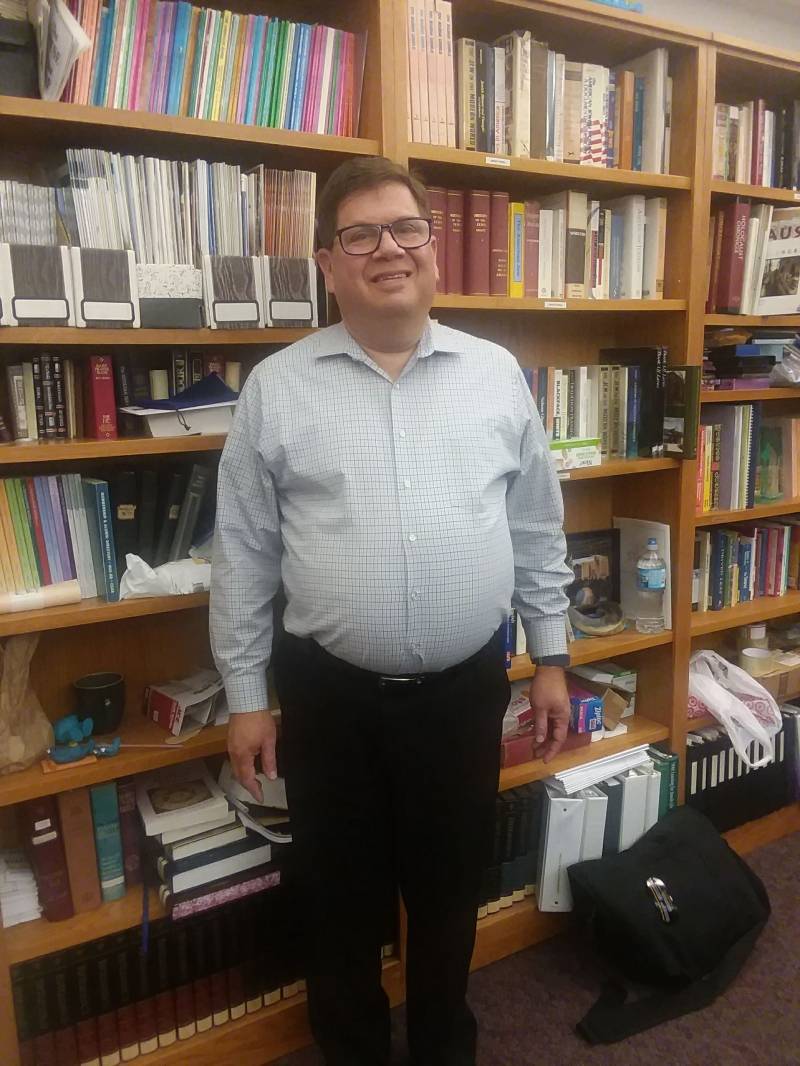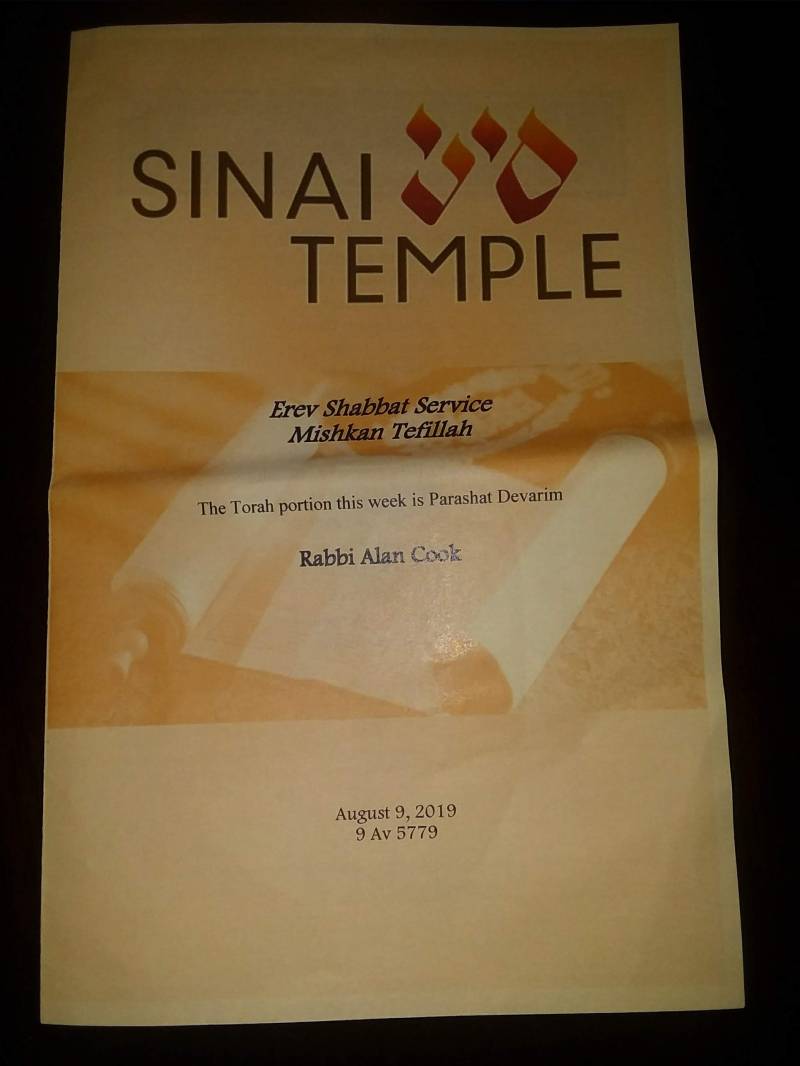On July 30th, I reached out to local faith leaders for this “When Faith Speaks” series. By August 4th, the El Paso and Dayton shootings had happened among other shootings across the country.

Rabbi Alan Cook was the first to agree to be interviewed for this series of conversations examining how local faith communities are weathering the racial tensions across the U.S. So given all that was happening, I decided to visit Sinai Temple for the August 9th Friday evening “Shabbat” (Sabbath) service. Something in me felt like by praying at Sinai Temple I would be praying with a community that understood the gravity of hate.
And yet, I was a bit anxious about attending. I didn’t want to be yet another disruptive, unnerving presence during this tense time. I notified Rabbi Cook in advance that I planned to attend Friday service, but I told him I’d understand completely if this wasn’t a good week to attend. Undeterred, he welcomed me to attend and invited me to bring family members as well.
I arrived at about 7:20 for 7:30 service. Rabbi Cook greeting me with a warm handshake, gave me a prayer book, and instructed me to sit wherever I’d be most comfortable. I entered the sanctuary of gorgeous reddish brown brick and stained glass quietly and I sat in the middle of the back row.
There were a few families already seated. The environment was sober and meditative with most sitting silently. When they noticed me, we exchanged brief glances and faint smiles. They then turned back to their own thoughts or toward the “bima” (raised platform) awaiting the start of service.

I didn’t feel lonely, but I was keenly aware of being a visitor in the space. Thus, I turned my attention to the printed program and began to find page numbers in the “siddur” (Hebrew-English prayer book) that is read from right to left.
Soon after, a smiling black man entered the sanctuary. He greeted me and sat next to me. During the service, he would help me follow the service, point out page numbers while I listened to him recite different parts of the service in that melodic Caribbean accent. I laughed inside acknowledging that — though we were complete strangers — his race and kindness made me feel more at ease.
Overall, the service was a vibrant exchange between rabbi, congregants, musicians, and the siddur (the prayer book) with one reciting prayers, rising, bowing, and sitting at appropriate moments in the worship experience.
Rabbi Cook called out page numbers between leading prayers for God’s forgiveness, affirmations of God’s sovereignty, respect for life and the planet. During the sermon, Rabbi offering an earnest call to action regarding gun violence reduction in our country, followed by acknowledgements of congregants’ birthdays, anniversaries, death remembrances, and announcements.
Following the service, all were invited to “oneg”, a lovely offering of refreshments and fellowship where I relaxed, sat, ate, and chatted with very friendly congregants.
Unfortunately, on the way home from the Shabbat service, I listened to a report that a young white man had been picked up in Las Vegas driving a car filled with weapons who was plotting to firebomb a synagogue or LGBTQ bar.
After pulling into my garage and closing the door, I sat in my car for a while realizing that, in this climate, making it home from a weekly Shabbat service is no small feat.
These questions of sanctuary and security is where Rabbi Cook and I would begin our interview.
Smile Politely: With the nation experiencing such intense racial hostilities, what concerns are your congregants sharing with you?
Rabbi Alan Cook: We were established in Champaign-Urbana in 1904 and we still exist as the only full service synagogue in a 45 mile radius. Yet, when I arrived in 2013, we didn’t have any public signage, so that sign you saw outside was only installed in 2014. And there was a lot of debate even before the current environment as to how visible, how public we should be.
In the current national climate, we continue to examine and assess how public we can be. Sure, we can focus on the fact that we have been here in Champaign-Urbana for 115 years and represent 250 or so families of the 500+ Jewish local households. However, I imagine that there are still some who don’t affiliate because of their fears of reprisals, hate-related incidents, etc.
SP: Are you finding there has been an uptick in hate-related incidents locally?
Cook: To my knowledge, there has not been any uptick of local incidents, thank goodness, but on a national stage…the shooting at the Tree of life Synagogue in Pittsburgh almost a year ago was really a wake up call to us (if not our politicians). That tragedy caused us here at Sinai to seriously reconsider our security measures.
I am fortunate to have wonderful relationships with many clergy partners in the community from other faiths. I can go over to my friends’ churches on a weekday and walk right in. Yet, as you saw when came to visit me today, we are on lockdown.
So, how do you balance the idea of being an open and welcoming place with the fact that religious communities like Sinai Temple have joined the ranks of schools, shopping malls, Walmarts, and other public places that people have to think twice about whether or not they will be secure when they go there?
And I don’t like to live with that kind of fear of looking over my shoulder, but I have to balance my sensibilities with the protection of my community and the protection of my family who also worships here.
When you are in a minority situation and you are considered “the other” by so many — whether that is considered neutral or carries negative connotations for people — that presents different kinds of concerns much like our African-American neighbors, our Muslim neighbors, our LGBTQ neighbors, our Latinx neighbors. So we at Sinai have to take our security seriously.
SP: It’s getting to be a long list, isn’t it?
Cook: Unfortunately, yes. However, we enjoy wonderful support from our elected officials, from the Champaign Police Department who are working to keep all of our religious communities safe and secure, but law enforcement is also stretched extremely thin these days.
SP: What other practices do you deploy to steady your community during challenging times politically?
Cook: We seek to build bridges. We seek to live in harmony and community. We know that if we are insular and only living our faith by burying our noses in scripture and not living our faith in action, then we are just spouting out empty words in our worship. We have to get our hands dirty and take action like hosting Bend The Arc Jewish Action Champaign-Urbana events such as Confronting White Nationalism earlier this month, among other collaborations.
Given the craziness we have seen over the last few years — and I am not being ironic or hyperbolic in the least when I say this — we are called ever more insistently to consider how all of our collective faiths can embrace one another.
SP: The question I am grappling with is how do we educate our children during these times? We have both gun violence problem and a bomb threat problem across Central Illinois. How do we disrupt these phenomena?
Cook: There are so many factors that we don’t always take time to consider that are conspiring against us building strong and welcoming communities. And yet, I firmly believe is that our default position is love. Kids learn hate, not the other way around.
I don’t want to jump to blame anyone’s parenting style, but kids are learning from popular culture, from their parents’ explicitly or inadvertently trusting or distrusting a particular group.
There is this story going around on social media about a young gamer who posted on the game’s message board and made a threat about shooting up his school. So, one of the other players reported him. And the owner of the game was able to figure out who the gamer was and the police came to his home. And his mom said “Oh, he is just a kid. He doesn’t understand the consequences of this message.”
This parent’s response is unacceptable. We have got to get to the point where kids and their parents understand the consequences of these threats. Enough with the notion that we don’t want to punish this kid because it will ruin his life because he comes from such a good family. No, if you’ve done wrong, you have done wrong, and you must be punished.
SP: Yes, but it is a hard argument to make as we are also watching our national leaders say and do cruel, life-ending, community-altering things and there are no consequences.
Cook: I agree completely. There is another component that we must address. We may see a kid who makes a Nazi salute or group of kids at a school-related event, or God forbid a kid thinks it is funny to wear a shirt with a noose on it.
That kid might get suspended or sent to an alternative school setting. However, if that suspension is not paired with an educational component, then the punishment alone is not enough for me. There must be additional teaching, training, de-programming, behavior modification that must be presented as well so that the kid rejects such choices in the future.
SP: What are you teaching your community during this time?
Cook: We teach out older students to be vigilant against anti-Semitism and be proud of who they are.
I teach the last year of our student education, which is our confirmation program for 10th and 11th graders. But I teach them that it’s not only important to be vigilant against anti-Semitism. If you are vigilant against antisemitism, but ignoring racism or homophobia or Islamophobia or anti-Latino sentiment, you are not doing your full job.
However, it is a tightrope we walk with our youth to communicate vigilance without instilling fear and anger in them. So we try to give them such an infusion of love that there is no room for hate.
SP: What closing message would you have for the Champaign-Urbana community to consider?
Cook: I have loved this community as my adoptive home. Our community has so much to offer. Therefore, we must look past the divisiveness that is being superimposed on all of us at the national level. If we resist those impulses, we can live in harmony and embrace each other.
To learn more about upcoming events at Sinai Temple, visit their website.
Top photo from Rabbi Alan Cook. All others by Nicole Anderson-Cobb








